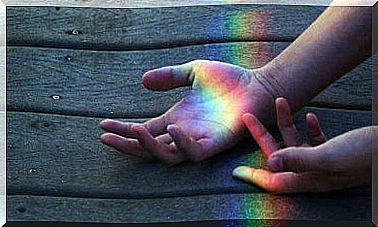Illusory Correlation – What Is It?

Illusory correlation means that you perceive that there is a connection between two variables in your environment, regardless of whether such a connection really exists. It is a phenomenon that is based on the brain’s way of processing information in order to function in a given environment.
But your interpretation of what is happening around you does not always completely correspond to reality. As a result, you can make assumptions based solely on your own experience. A perfect example of illusory correlation is one that breeds stereotypes and prejudices against certain ethnic groups.

What is illusory correlation?
As we mentioned above, illusory correlation means that one seems to notice a connection between two elements which does not necessarily exist. It is a confirmation bias where an individual’s experiences make him assume that the two elements are connected to each other, even if this need not be the case.
Also, it is not always a direct personal experience that makes you make certain associations. In other words, there are cultural and societal beliefs that support these biases, even when you have no direct experience of the elements in question.
A couple of examples are when it is assumed that people with tattoos and piercings are dangerous or that people wearing uniforms are well educated and obedient.
What characterizes illusory correlation?
Illusory correlation often causes you to blindly follow your cognitive biases. Thus, you firmly believe that there is an interaction between two factors that have nothing to do with each other. Simply put, illusory correlation results in a simplification of certain mental processes, which causes you to act on the basis of your direct or indirect experiences.
In the same way, some groups in society behave on the basis of simplified thought processes. We trade on the basis of the information we have access to. Illusory correlation can thus be said to be a mental shortcut that simplifies the relationship between two or more variables.
Illusory correlation and social psychology
Society reflects certain types of perceptions, behaviors and attitudes. Our behavior varies depending on who we associate with and we feel most at home in our own social groups.
Consequently, illusory correlation is something that affects our sense of belonging to certain social groups, which sometimes causes the gaps between the groups to widen. This explains why a certain way of thinking can strengthen the groups we identify with. Our mind naturally searches for that which in a positive way distinguishes our own group from others.
Some examples from real life
Here are some specific examples of this bias:
- The idea that there is a connection between tattooed people and criminals.
- The assumption that low-income earners are uneducated.
- The belief that people of a different race or ethnic background are dangerous.
- Presumably people who dress well and are physically attractive are well educated and rich.
Illusory correlation in other contexts
Illusory correlation is not something that is only relevant with respect to social groups. If you have experienced something once, illusory correlation leads you to believe that the exact same thing will happen again. Here are some other concrete examples:
Amulets
Let’s say that one person has suffered several unfortunate events in a row. The person in question is told that some amulets can remove “bad energy”. After obtaining such an amulet, the person states that it brings “better happiness”.
Therefore, this person begins to associate the use of amulets with the liberation from bad energy. Even if the person has had negative experiences while using the amulet, he will probably continue to wear it.
Horoscope
Reading horoscopes is also something that affects people’s perception of reality. In other words, people who read horoscopes have a tendency to believe in the character descriptions given by them, because as a rule, these apply to people in general. In doing so, they focus on details that are easiest for them to recognize, while ignoring the descriptions that do not fit them.

Lucky
Similarly, luckiness is another phenomenon that often falls under illusory correlation. People such as always go to job interviews wearing “tour socks” often attribute their successful interviews to these socks.
Furthermore, people associate bad luck with certain clothes, people and objects. Illusory correlation gives us an interesting insight into how we relate to objects and people depending on our previous experiences.









